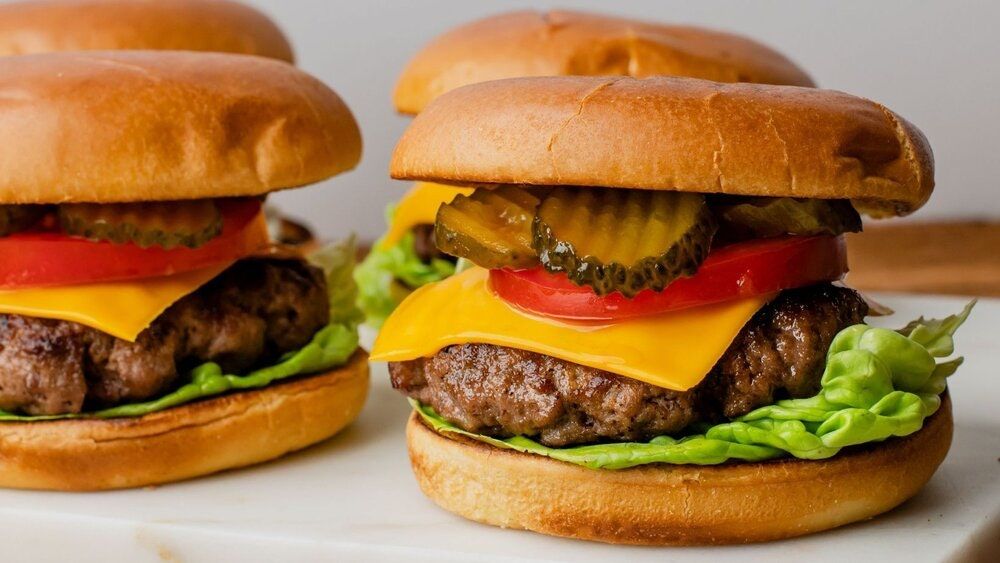
Vegetarians have had to put up with a LOT. Oh, you don't eat meat? Let's just put a mushroom in between two pieces of bread and call it a veggie burger. Or let's make a turkey shape out of tofu for Thanksgiving and call it a fun name and see how well that goes with mashed potatoes. We've come a long way since those days, and fake meat is now everywhere. As a vegetarian, I think this deserves a resounding hallelujah. We've developed alternatives that taste just like meat and get all the tastiness without any of the guilt, right? Not so simple.
There are some tradeoffs regarding the nutritional, sustainability, and animal welfare implications. We've broken it down for you so you can be the most interesting person at your summer BBQ. We're focusing on Impossible, Beyond, and regular meat.
Nutrition
Just because something is plant-based or vegan, that doesn't mean it's automatically healthy. French fries are plant-based, but probably not the healthiest option. Abigail Taft, MS, RD, a Nutritionist and Registered Dietitian, says 'Not all red meat is created equally but an organic, grass-fed beef is an extremely nutrient-dense food. It's a whole food, completely unprocessed...The ingredient list for imitation meats is 10+ ingredients, highly processed and most ingredients are not high quality. My philosophy is it's always best to eat simple, real food, not something that's made in a lab.' One of the 10+ ingredients in Impossible burgers is Heme, which is a high-quality iron naturally present in beef. Impossible Foods recreated that essential nutrient by taking DNA from soybean plants and inserting it into a genetically engineered yeast. Advocates of the beef industry claim that this is 'not natural,' (please don't get us started on what natural means) and due to the lack of research surrounding genetically modified heme iron, nutritionists are divided on how meatless burgers fit into daily, balanced diets. The Impossible burger also contains processed ingredients that your grandmother probably didn't have in her pantry, like methylcellulose, yeast extract, and cultured dextrose.
Sustainability
A study from the University of Michigan found that the Beyond Burger generates 90% less greenhouse gas emissions and requires 46% less energy, 99% less water, and 93% less land compared to a quarter pound of beef. In their life cycle assessment, they included ingredient and raw material supply, processing and packaging, cold storage, distribution to point of sale, and disposal of packaging materials. Retail and consumer stages were excluded as they were considered equivalent in both systems. Packaging, interestingly, had a sizable impact. The study estimated that switching to polypropylene trays made of 100% post-consumer recycled material from virgin PP would reduce the overall greenhouse gas emissions by 2% and would reduce energy use by 10%. Production of the dominant ingredients, including pea protein, canola oil and coconut oil, all had significant impacts on energy use and land use.
There's really no question regarding what's more sustainable, but it's not that simple. Vegans and vegetarians never contributed to the beef industry's carbon footprint in the first place, so they're potentially contributing to a different carbon footprint by incorporating these meatless burgers into their lives. For every choice, there's a tradeoff. If you're trading a ShakeShack burger for an Impossible burger, you're lowering your footprint. If you're trading a Sweetgreen veggie caesar for an Impossible burger, you're not doing the polar bears any favors.
Animal Welfare
Good news first, because there's less of it: cattle raised for meat are actually usually walking around, socializing and eating digestible food for the first six months of their lives, which means these animals start off with significantly better lives than other animals like pigs and chickens. After those first several months (trigger warning), conventional cattle systems incorporate painful mutations and branding without any medical relief for the pain. In the last six months of their lives, they're confined together in dirty conditions free of any vegetation. They're fattened on grain, which causes significant internal stress and disease. Cows have excellent problem solving skills and once they master how to solve a problem, they celebrate by jumping or running happily. Alternatively, they feel rancor towards those who have hurt them and perfectly remember their experienced trauma. If we can avoid contributing to this trauma, shouldn't we? For yours truly, this is my most important factor. I know I may not be hitting my nutritional goals or reducing my carbon footprint as someone who's already abstaining from meat, but the guilt-free feeling of stuffing my face with an impossible burger with lettuce and tomato, Heinz 57 and french-fried potato is, truly, a cheeseburger in paradise.
Here's the thing
We don't want to make a habit of having a burger every day. It's kind of a treat yourself, when-in-Rome type of thing (and by Rome I mean a beach BBQ or Yankees game). Like ice cream or pasta, burgers are good in moderation. While there isn't a nutritional reason to eat Beyond or Impossible, the sustainability and animal welfare benefits largely outweigh any potential downsides. Unless your sole goal is to eat less processed foods, Finch is fully behind imitation meat.
